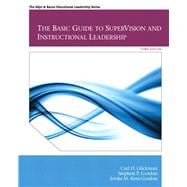
Note: Supplemental materials are not guaranteed with Rental or Used book purchases.
Purchase Benefits
Looking to rent a book? Rent Basic Guide to SuperVision and Instructional Leadership, The [ISBN: 9780132613736] for the semester, quarter, and short term or search our site for other textbooks by Glickman, Carl D.; Gordon, Stephen P.; Ross-Gordon, Jovita. Renting a textbook can save you up to 90% from the cost of buying.
1. SuperVision for Successful Schools
II. KNOWLEDGE
2. The Norm: Why Schools Are as They Are
3. The Exception: What Schools Can Be
4. Adult and Teacher Development within the Context of the School: Clues for Supervisory Practice
5. Reflections on Schools, Teaching, and Supervision.
III. INTERPERSONAL SKILLS
6. Supervisory Behavior Continuum: Know Thyself
7. Directive Control Behaviors
8. Directive Informational Behaviors
9. Collaborative Behaviors
10. Nondirective Behaviors
11. Developmental Supervision: Theory and Practice
IV. TECHNICAL SKILLS
12. Assessing and Planning Skills
13. Observing Skills.
14. Research and Evaluation Skills
V. TECHNICAL TASKS OF SUPERVISION
15. Direct Assistance to Teachers
16. Group Development
17. Professional Development
18. Curriculum Development
19. Action Research: The School as the Center of Inquiry
VI. Cultural Tasks of Supervision
20. Facilitating Change
21. Addressing Diversity
22. Building Community
Appendix A: Review of Interpersonal Behavior in Four Supervisory Approaches.
Name Index
Subject Index
The New copy of this book will include any supplemental materials advertised. Please check the title of the book to determine if it should include any access cards, study guides, lab manuals, CDs, etc.
The Used, Rental and eBook copies of this book are not guaranteed to include any supplemental materials. Typically, only the book itself is included. This is true even if the title states it includes any access cards, study guides, lab manuals, CDs, etc.